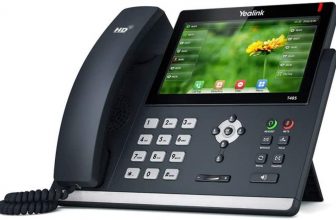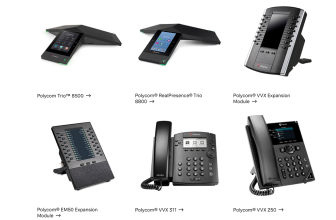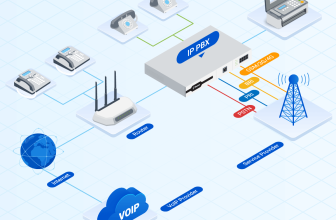If you are looking for the best business phone for small business, you will quickly realize that there are plenty of options available. Two of the most popular phone system solutions include PBX and VoIP. At the same time, you might be wondering what the best phone system is for your business. Are VoIP services and a PBX system the same things?
While they are not the same, there are some similarities and differences you should know. Learn more about the best PBX and VoIP phone options, and find the best virtual phone system to meet your needs.
What Is PBX?
First, let’s take a closer look at a PBX system. PBX stands for private branch exchange. This is a popular type of business phone system. The branch exchange takes all of the office desk phones and connects them through the same network. Therefore, it is possible for businesses to transfer calls from one place to another easily while also making Internet calls more straightforward.
Through a PBX, a company can have more phones than it has phone lines. Extensions are used to take calls and we direct them to the right business numbers. While some companies with a PBX might have a few physical phone lines, an IP PBX system limits the number of required phone lines.
For example, some companies might be interested in something called a hosted PBX system. This is a cloud-based phone solution that does not have a complicated on-site installation process. Because of the numerous features and customizable options available, PBX phones have become a popular option for numerous businesses across multiple industries.
What Is VoIP?
Next, many businesses are also considering a voice-over IP, or VoIP phone option. As the name suggests, this is a business phone option that uses the internet to transmit data related to voice phone calls. This type of phone system takes your voice, records it, and transforms it into data. Then, this data is compressed, turned into smaller data packets, and transferred to the VoIP provider. The provider then takes this information and sends it to the target phone number.
Of course, it probably sounds like a long, arduous, and extensive process; however, remember that this information travels at the speed of light. Therefore, it doesn’t take any longer than any other phone system. Now, many VoIP providers offer a wide number of features that can be helpful to businesses, including HD voice calling. This means that companies can tailor their VoIP phone plans to meet their needs.
What Are the Differences?
Clearly, both VoIP and PBX systems are popular among small businesses; however, if you need to figure out which one is best for your company. Therefore, it is critical to take a look at some of the differences between VoIP and PBX phones. A few important points to keep in mind include:
The Reliability of the Service
Arguably, the most important factor you need to consider is the reliability of the service. If you use a VoIP system, you are entirely dependent on the internet. Therefore, if there is an internet outage, your phone system might not operate. Usually, there is an emergency backup system, so you need to talk to your VoIP provider to understand what happens if your internet goes down. Sometimes, received calls meant for you will simply go to your voicemail instead. Then, you can listen to your voicemail once you get your internet access back.
You also need to think about the reliability of your PBX system. Typically, a PBX system operates partially on your phone lines. As a result, you might be partially protected in the event of an internet outage or loss of power; however, if you have an IP PBX system, it will only work as well as your internet connection. Therefore, the quality of your internet provider plays a significant role in both your VoIP and PBX phone plans.
Possible Costs
Next, you need to take a look at how much money you will spend on your system. Because a VoIP system doesn’t have a lot of equipment, there aren’t a lot of maintenance expenses. As a result, your costs should be lower as well. Furthermore, because the system uses the internet, long-distance and international calls should not incur additional charges. You should have a fixed, monthly subscription that allows you to budget accordingly.
Because traditional PBX systems have a lot of large cabinets that need to be installed, they are typically more expensive. Furthermore, you may need to hire a professional IT team to perform maintenance on the cabinets from time to time. If you decide to go with a newer IP PBX system, you might be able to reduce these monthly operating costs, making this advanced system more affordable.
The Size of Your Company
You should also consider the size of your company. How many people do you think you will have using your phone system at any given time? With a VoIP system, you are limited in the number of people who can use your system at the same time by the bandwidth of your internet connection. You can add and remove users easily, but you may need to increase your bandwidth if your company expands.
If you have a traditional PBX system, the number of people using your phone system at any given time will be limited by the number of lines you have. If you want to add more lines, you may need to make more space for servers and hardware. If you have an IP PBX system, then it should be easier for you to add and remove users with ease.
Your Sound Quality
Finally, you need to think about the quality of the sound as well. A VoIP system’s phone calls are entirely dependent on the quality of your bandwidth. The more bandwidth you have, the better your call quality. For example, if you have fiber optic cables, then you should have more bandwidth, which should improve the quality of your phone calls. Or, you might want to upgrade your phone to HD voice calling, which is an option provided by some VoIP companies.
Because a PBX system is still partially dependent on phone lines, sound quality shouldn’t be an issue. You should talk to the PBX provider about the sound quality and take a look at a few reviews, but because you still have on-site support, your sound quality should be solid.
Which Option Is Right For You?
So, how do you decide whether a VoIP system or a PBX system is right for you? Even though each system has its benefits and drawbacks, the right system from one company is not necessarily the right system for yours. You need to think about the size of your company, the flexibility you need, and the customizable features you require.
If you already have an on-site support team and you want to have the highest sound quality available, then you might want to go with a PBX system. If you are looking for an option that has less equipment and more flexibility, then you might want to go with a VoIP system. If you are looking for help making this decision, consider reaching out to a professional who can assist you.






